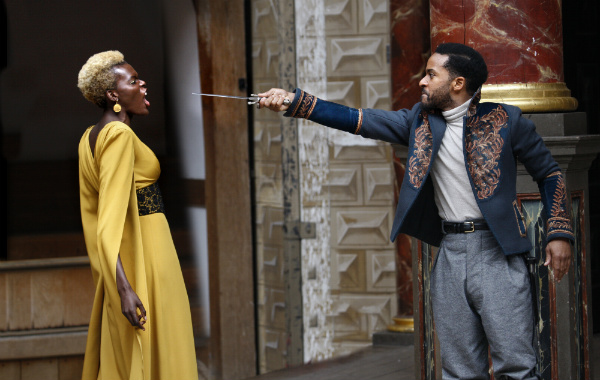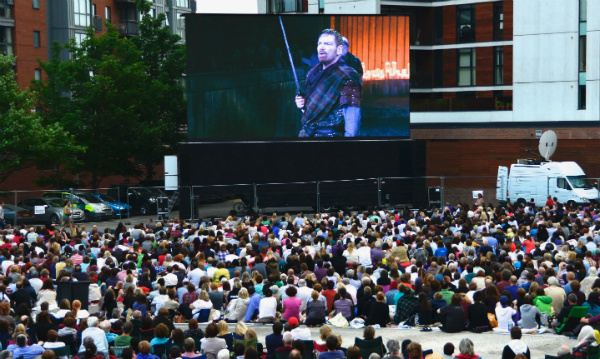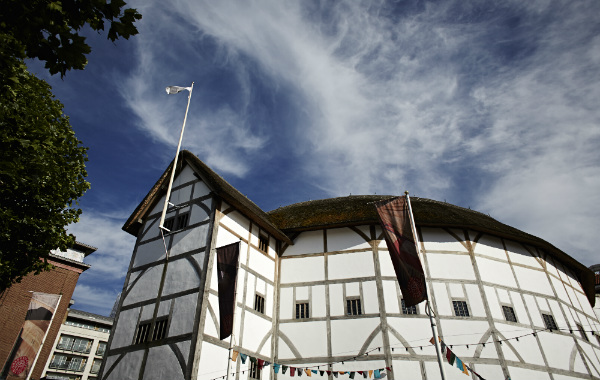
Othello at The Globe Theatre: Photo by Simon Annand
Pablo Picasso said it well:
'Art washes from the soul the dust of everyday life.'
We all need this, and never more than in these uncertain times when politics, climate and technology are changing our world faster than we can adapt.
A few years ago The Lowry in Salford and I collaborated on an evening aimed to welcome D/deaf people to their centre and make them feel they belonged there. I gave a short introduction to the group, commenting on how deafness can be highly challenging and isolating so art is even more important, providing a much-needed escape and mental freedom.
Arts Council England’s (ACE) 2010 Strategic Framework for the Arts has a goal dedicated to this:
'More people experience and are inspired by the arts’.
Success is described in four ways including:
'larger and more diverse audiences experiencing and benefiting from the work of the organisations and artists we fund.'
All good then?
It can be. But 'good' is all too rare. And when it's not good, it can unfortunately achieve the very opposite of what is intended. Poor access to the arts, whether intended, damages and reinforces exclusion. The problem is unconscious ignorance: arts organisations don't know what they don't know. If audiences are coming in and they are on a reasonable footing business-wise, they may pause when they look at diversity statistics and ponder the numbers, but they cannot see what happened to those potential audience members they perhaps inadvertently excluded.
I will give an example. Every 2 years my city has a superb international festival - the Manchester International Festival (MIF). 4 years ago I tried to book tickets for performances which were accessible to me as a deaf person who would need captions or something similar. Oh dear. It was not possible to find accessible performances. The Access page of the website focused mainly on wheelchairs and assistance dogs (very important of course). It took a long time to not get very far with this process. It was frustrating and humiliating. I was dying to see Kenneth Branagh in Macbeth, but by the time I had figured out that there was not a single accessible performance, all the tickets had sold out. I determinedly went to a live relay performance at the local cinema, trying hard not to feel diminished by the lack of any captions (what a missed opportunity!). I had graduated in English Literature and studied Macbeth so knew it well. But trying to sync my memory of the play with the (to me) silent actors on screen was difficult and reduced the joy I knew I should have got from the performance.

Photo of Macbeth outside broadcast for Manchester International Festival: credit Rob Martin
I did attend the wonderful Maxine Peake's performance of The Masque of Anarchy with a lipspeaker in attendance arranged by er... me. But as there had been next to no communication with MIF (despite our attempts) we ended up perched in a poor seating position, with almost no light on the lipspeaker seated precariously along a bench and meaning my deaf friend and I got stiff necks from trying to look sideways for an hour and glance at the actress occasionally.
I am an incurable optimist and a great believer in things being able to improve, so found out who to write to, via an Arts Council contact (who I would not have had if I had not happened to be in a voluntary Chair role with an arts organisation myself). I wrote a carefully worded email explaining why the MIF had excluded me and other deaf people and how that felt ‘Like hearing that the biggest party is happening on your doorstep but you are not invited’. Guess what? No reply. No attempt to engage. No interest.
Two years ago the situation improved a bit. A (very long) list of accessible performances was included on the website. This meant anyone interested had to scroll through the entire list to see if the performance in which they were interested was available. (I don’t know why there was no search facility, or why this was not linked to the main search facility – presumably because deaf and disabled people have acres more time on their hands for this sort of thing?).
This year I was pleased to learn from one of Result CIC’s course participants that MIF is recruiting for an Access Manager. The Disability Discrimination Act has been in place for 23 years and the Equal Act for 8. Too little too late? I look forward to a ticket to the party!
The problem with all this is that you start to learn not to expect much that is good. And this can lead to a vicious circle. I have heard several people who work in the arts ask ‘Why can’t we get D/deaf people interested in theatre?’. The answer is they are interested probably– but it’s complex. Part of the reason the theatres are not seeing regular D/deaf people in the audience is that those who might be stout-hearted enough to keep trying to get access, eventually get fed up. It can be easier to assume the worst than to be enticed by a wonderful performance, then discover you won’t be able to access it.

Photo of Globe Theatre: credit John Wildgoose
So when I read about The Globe’s run of Othello with the dream team of Mark Rylance and André Holland it was with slight trepidation that I leapt to the website to book. I went first to the Access page and got that familiar leaden feeling as captioned performances were not highlighted. I persisted and went to the general booking section. Ah ha! One captioned performance (in 2 and a half months’ run). But yes – on a Saturday afternoon, so with the investment of a junior royal’s ransom, I could get there. ‘Yesss!’ Expect, ‘Nooooo!’ when I requested tickets it said ‘none available please try another date’ (problem: there wasn’t another date with captions). While this performance is undoubtedly up there in terms of its quality and popularity, I could not believe a matinée had already sold out. I felt desolate. I wanted to see one thing this year. And I couldn’t.
So I decided to challenge this. I am glad I did. It turns out that The Globe is one of the most enlightened London theatres. Their Access Manager(yes!) replied speedily to my email and explained that there were in fact tickets but I would have needed to join their special Access Scheme to be able to ‘unlock’ the seats for the captioned performance. Who knew? Certainly not me. I will cheerfully admit I am an impatient patron of the arts and hate layers of bureaucracy which can be involved in making ‘convenient’ online bookings. So I am sure that came into play, but I couldn’t help wondering how easy it would have been to just give up, once, apparently, there were no tickets. I understand The Globe ‘protecting’ accessible seats to ensure they are filled with the people who need them, but by not linking the main booking site to this information, they are (were, I hope?) defeating the object a little.
Last year I gave a short keynote speech at the Arts Marketing Association. I included a bit of simple research about the availability of captioned films in my area which I calculated to be less than 0.5% despite deaf and hard of hearing people representing 15% of the population. Ellie Parfitt is taking up this issue, including the way cinemas often schedule captioned films at times when most people do not want to go to the cinema. (Again, is there a bit of bias in there about deaf people not working or having more time on their hands? Consider signing her petition to the UK Cinemas Association about this.
Anyway, All’s well that ends well in the case of Othello and I am looking forward to the play and very happy to have a ticket. I remain optimistic and look forward to a world where accessible performances will be proportionately available at times me and my friends want to see them.